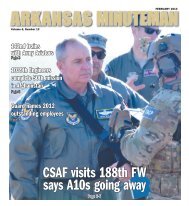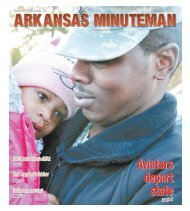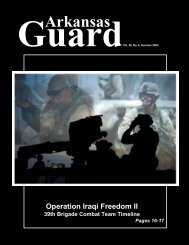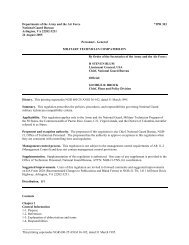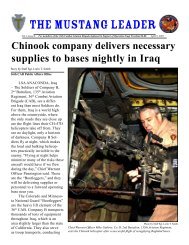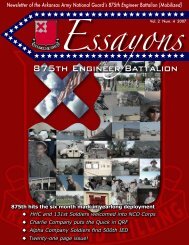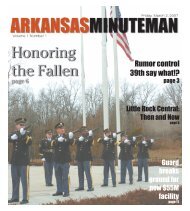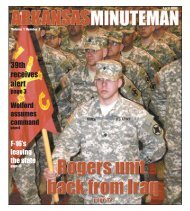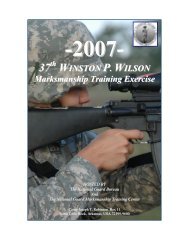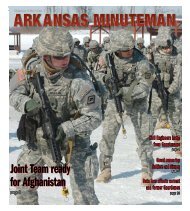Fighting New Battles - Arkansas National Guard
Fighting New Battles - Arkansas National Guard
Fighting New Battles - Arkansas National Guard
You also want an ePaper? Increase the reach of your titles
YUMPU automatically turns print PDFs into web optimized ePapers that Google loves.
The <strong>Arkansas</strong> Minutemancover storyPTSD, continued from page 31harder for them to sleep and concentrate adding irritability totheir list of obvious symptoms.Other common reactionsOther common reactions to combat stress include:• Depression — Feeling down or sad more days than not, andloosing interest in hobbies or activities that used to be enjoyableor fun. Depression also involves a feeling of hopelessness ordespair, or the feeling that things are never going to get better.• Suicidal thoughts — War experiences and combat stressreactions, especially personal loss, can lead a depressed person toconsider hurting or killing themselves.• Anger or aggressive behavior — Anger and irritability aresymptoms of PTSD and often associated with fear or loss of control;someone who is physically tense tends to be angry as well.A typical example is over reacting with anger to the slightestprovocation.• Alcohol and/or drug abuse — “Self medicating” by drinkingor abusing drugs is a common way many cope with upsettingtraumatic stress reactions. When a person wants to avoid thememories or feelings associated with combat, alcohol or drugsseem to offer a quick solution, but they actually lead to moreproblems.• Self blame, guilt and shame — Sometimes service memberstake too much responsibility for bad things that happened, forwhat they did or did not do or for surviving when others didn’t.Guilt and self blame are common for those who have beenthrough difficult combat situations.Headaches, gastrointestinal complaints, immune systemproblems, dizziness, chest pain and discomfort in other parts ofthe body are common in people with PTSD.Effects on family lifeSometimes the everyday stress of family life can feel overwhelmingfor the service member. He or she may become moreirritate or react more strongly to typical family issues, frighteningspouses and children, and even the service member. Continuedangry outbursts or over-reacting or everyday situations may indicatea need to seek help.Men and women often differ in the way in which they integrateback into the family. IN coping with stress men may isolatemore and leave the home to be with friends or buddies. Womenmay need to communicate more with their partners. Some malepartners may experience resentment or misunderstanding towardsthe returning woman veteran, and are reluctant to sympathizewith her experiences in the combat area.Also, children may feel resentment, abandonment, sorrowor anger when a parent leaves. A child may have learned to relymore on the parent who remained at home, and homecomingmay bring back the child’s normal fears of separation.Problems with family relationships, or relationships withother people, should not be overlooked. Initial difficultiescan turn into marital separation and divorce, family violenceand caregiver burden. Communication is essential to workingthrough these problems, as is talking to a counselor or seekinghelp at every level.Getting helpCombat stress reactions usually go away over time. But ifthey persist the Soldier or Airman may develop PTSD. The goodnews is that there are effective treatments to PTSD and many ofthe symptoms discussed above.Counseling for combat stress reactions or PTSD is quitepractical and involves common sense steps. The person hasregular conversations with a trained professional. They learnabout PTSD and how it is affecting them and those around them.They may even talk with other service members who served incombat operations as a way to give and receive support.Service members and their families may receive treatmentfor war zone related problems from a number of qualifiedsources, including chaplain services, mental or behavioral healthservices through hospitals or clinics, primary care physicians ornursing and family assistance programs.Many <strong>National</strong> <strong>Guard</strong> and Reserve members will receivetreatment for PTSD at VA PTSD treatment programs andReadjustment Counseling Service Vet Centers. Most treatmentis performed in an outpatient setting while the service membercontinues to live at home and attend individual appointments andgroup sessions.Where ever the Soldier or Airman seeks help, the treatmentusually focuses on assessment, learning, coping, medication andtherapy.Common therapies for treating PTSDPTSD is often treated through a variety of forms of psychotherapyand drug therapy. There remains no definitive treatmentand no complete cure, but some treatments appear to be promising,especially cognitive-behavioral therapy and medication.• Cognitive-behavioral therapy (CBT) — This has beenshown to be the most effective treatment for PTSD. CBT involvesworking with thoughts to change emotions, thoughts andbehaviors. There are several types of CBT:Exposure therapy uses careful, repeated and detailed imaginingof the trauma (exposure) in a safe, controlled environment tohelp the person face and gain control of the fear and distress thathas overwhelmed them.Cognitive restructuring allows patients to identify andPage 32 Summer Fall 2005 2006



